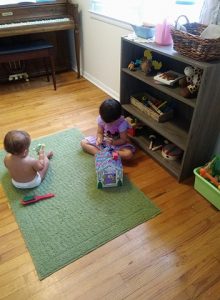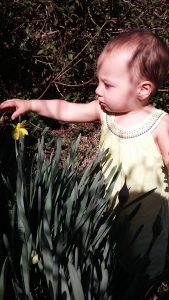The importance of free play for kids
Here is my shout from the rooftops to “leave your child alone!“. Now, I don't mean that you should ignore them. In fact, please don't. They love you. They need you. But what they don't need you for is play and discovery. So, my challenge to you is to back off a bit and stop teaching your young kids so much! Understand the importance of free play!

Unfortunately, we live in a society where what a child can tell us is more valuable than what a child knows. So, we quiz. We make videos of our kids naming the planets in the solar system at the age of 2. Our kids are singing the ABC song before their 2nd birthday. And we think this is good; we value rote memorization.
It doesn't matter to us that what we are teaching them doesn't matter to them; that it's absolutely useless.
And when a child is quietly playing, we look to see if there is value to their play. If we determine there isn't, we join in and teach them.

We feel the need to make their play valuable; or at least what we consider valuable.
But, what if we are doing more harm than good by teaching our children? What if they are learning and we are getting in the way?
What would happen if you stopped teaching your child?
Here is a scene that is probably happening in millions of households all over the world right this very moment: A precious 4-month-old baby is laying on her blanket, looking around, getting to know her surroundings, thanks to her rapidly developing visual acuity. Suddenly, she lifts her foot and catches it in her hand. She has surprised herself!
Up until this moment, she was unaware that she even had feet! And she can catch things with her hands, too!?
This moment for her is pure magic!
We have it in our heads, though, that language acquisition trumps all, so mom and dad rush over to the sweet child to inundate her with phrases such as, “You found your foot! That's your foot! Good job!” or “You caught your foot! You have 2 feet! One, two!“.
The discovery is over; the magic, gone.
Here's another scenario I'd like you to give thought to: Your child is sitting where your driveway meets your yard. He's poking around in the dirt with a stick and he finds a worm. He moves in closer to examine his new friend, touching him gently and guiding him back into his soft, cool home in the dirt.
You can't help it, though.

You rush over to him and Google the type of worm he has found, tell him, and you explain to him where worms live, what they eat, and why they sometimes come to the surface.
He immediately stops playing and discovering on his own and continues the conversation with you. Now, instead of exploring on his own, he follows you around asking what the two of you can discover next.
No longer is he exploring or discovering, he is merely following you.
Again, the discovery is over; the magic, gone.
Once upon a time, young children were described as cera molle, which translates “soft wax”. Children can be molded and shaped. Dr. Montessori, in her book “The Child In The Family” (p.50) stated she agreed with this sentiment. What she disagreed with, however, was who should do the shaping. It should not be educators or adults that mold the child into what we want them to become; the child should be given the opportunity to shape, or mold, his own self.

Dr. Montessori understood the focus of free play!
Is free play important?
What if we took a few steps back and let our children discover this big, new world in their own way?
What if, instead of jumping in to cram information into their rapidly forming brains, we let their brains develop through exploration and independent play?
Independent play has many benefits, including increased self-esteem and and an increased ability to be able to focus on tasks. So, not only is taking a few steps back easier on us parents, but it's better for the child.
Win-win!
I'm in no way saying that the parent who rushes in to teach their child instead of letting them explore cares less about their development. In fact, these parents care a great deal, which is why the are so diligent about instructing.
Unfortunately, though, these parents are missing opportunities for their children to develop independence and to satisfy natural curiosity all on their own.
What causes this, I wonder?
How can I stop comparing my child to other kids and let them focus on free play?
I have no doubt that social media is partially, if not mostly to blame for this phenomenon of us disallowing our children to develop naturally.
We feel pressure to teach our young children completely useless information in an, sometimes subconscious, attempt to prove to friends and family that we are good parents and that our children are intelligent.
Where are the videos of children focused on free play?
And sometimes there is a clear competitive motivation for teaching our children.
When we see that a friend or co-worker has posted a video on social media of their 1 year old reciting the alphabet song, it's completely natural to wonder if our child of the same age should be doing the same thing!
Don't, though. Please!
Next time you feel this way, I encourage you to consider the usefulness of what your child's peer is doing. Is the alphabet song going to help them read?
Probably not….actually, no; most certainly not.
Is being able to name all of the planets beneficial in some way?
No, because a young child has no concept of the solar system…they simply aren't capable of grasping something so abstract! And they will forget this useless information in a couple years, then learn it when they are capable of understanding such things.
So, what do we do?
How do I follow my child's interests?
Maybe stop teaching and just observe. One of my favorite Montessori quotes (Also from The Child in The Family, p.52) is “….he is quite an acute observer who sees things we cannot imagine he can have seen. How peculiar, then, that we must use bright colors, exaggerated gestures, and loud voices to attract his attention.”
We can't know what children are learning sometimes, and it isn't for us to know. Just let them explore and trust that they are learning!
The takeaway from this article is to make an attempt to stand back, stop teaching, and appreciate your child's learning. They don't need you for much of it!
I recently read a Romper article that I enjoyed. It was filled less with pedagogy and more with humor, but there is something to be learned from it. Follow the link to give it a read!
I am interested in your take on this!
Do you feel the need to constantly teach your child, or do you appreciate that they are learning without being taught? Are you molding them or letting them mold themselves?
Cheers and don't forget to subscribe!

Pingback: Do I Need to Send My Child to Preschool? – Parenting with Purpose
Pingback: Let Your Child Be Bored – Parenting with Purpose
Pingback: How to Teach Your Young Child About Nature – Parenting with Purpose
Pingback: Taking Risks is Good For Your Kids – Parenting with Purpose
Pingback: How to Set Up a Dishwashing Station for Your Child – Parenting with Purpose
Pingback: Kids Can’t Get Along? Here Are 15 Tips to Help You Out. – Parenting with Purpose
Pingback: Why I Don't Tell My Kids "Good Job"
Pingback: Open-ended Toys: The Grimm's Rainbow — Parenting with Purpose
Pingback: Creating A Yes Space For Your Baby — The Montessori-Minded Mom
Pingback: What is the Absorbent Mind? — The Montessori-Minded Mom